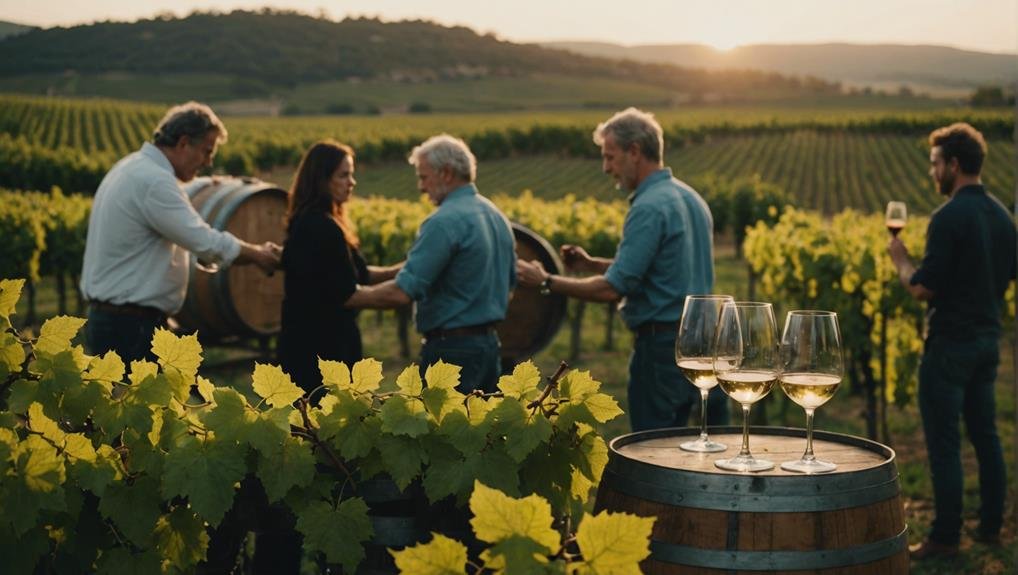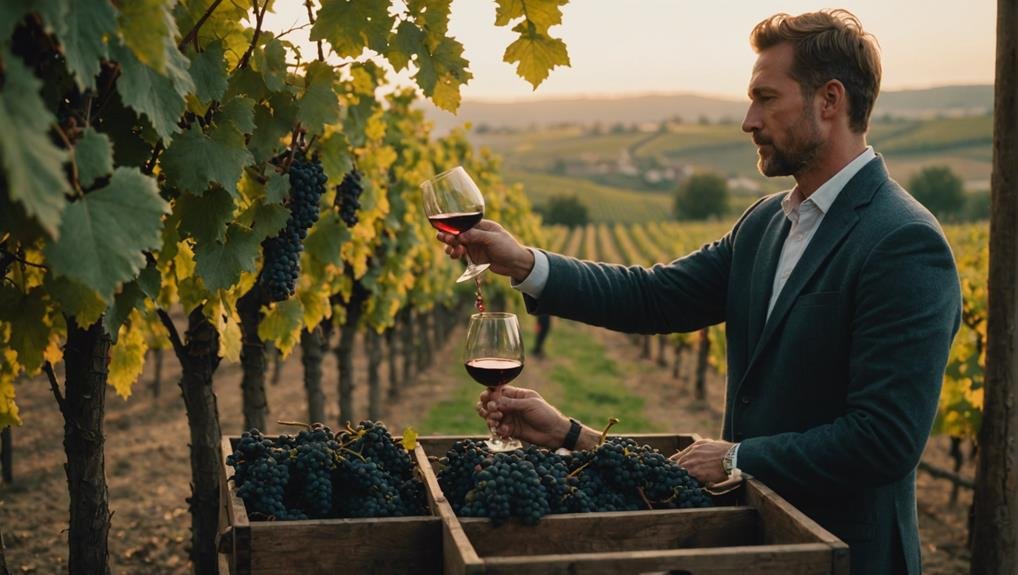In the wine industry, there are inspiring success stories like Athena Bochanis' innovative wine-importing business and André Hueston Mack's journey to becoming a top sommelier and winemaker. Each role, whether it's viticulturists or enologists, plays a unique part in the industry.
Overcoming challenges such as climate change and changing consumer preferences demands resilience and ongoing learning. The benefits of working in the wine industry are significant. You get to visit famous vineyards, share specially selected wines, and connect with wine lovers. Important skills include good communication, flexibility, and creativity.
By keeping up with market trends and staying informed, anyone can find success in the wine world. For example, Athena's approach to importing lesser-known Hungarian wines has filled a niche market, while André's focus on creating wines that tell a story has resonated deeply with consumers. Skills like adaptability and continuous learning have been crucial for them.
Stay tuned for more tips and stories to help you navigate and succeed in the wine industry.
Personal Stories of Success
In the wine industry, the personal journeys of Athena Bochanis, André Hueston Mack, Carl Villeneuve Lepage, Luke Wohlers, and Esther Mobley show the power of passion and hard work. Each navigated their unique paths, facing various challenges to reach success.
Athena built a thriving wine-importing business, focusing on bringing unique wines to new markets.
André earned recognition as a distinguished sommelier and winemaker, blending expertise with creativity.
Carl's dedication to winemaking earned him international acclaim, especially for his innovative techniques.
Luke's focus on quality helped his distribution company stand out in a competitive market.
Esther's insightful writing has shaped opinions and informed many in the wine community.
These stories remind us that dedication and a deep love for wine can lead to impressive achievements. They inspire us to pursue our own passions with the same level of commitment.
Diverse Roles in Wine
The wine industry offers many different roles, each essential for making, marketing, and enjoying wine. For example, viticulturists grow the grapes, and enologists turn those grapes into wine. Cellar workers take care of daily tasks, while sales and marketing professionals get the wine into stores and restaurants. Educators and sommeliers teach people about wine, enhancing their tasting experiences. Writers and distributors help spread information and ensure that wine is available to everyone.
This wide range of jobs means you can find your place, whether you're working in the vineyard or behind the scenes in marketing. Each role is crucial, making the wine industry a dynamic and interconnected field with many chances for growth and success.
Overcoming Industry Challenges

While each role in the wine industry is crucial, we face significant challenges that need strategic solutions. Climate change, regulatory complexities, and changing consumer preferences are just a few of the issues we encounter. It's essential to develop resilience strategies to adapt to environmental changes, navigate legal requirements, and innovate to meet market demands.
For example, climate change affects grape growing conditions, so winemakers must explore drought-resistant grape varieties and invest in sustainable farming practices. Regulatory complexities can be managed by staying updated with local and international laws and working with legal experts. Shifting consumer preferences require us to keep an eye on trends, such as the rising demand for organic and natural wines, and adjust our offerings accordingly.
Collaboration and continuous learning are key to staying ahead. Sharing best practices and fostering a supportive community help us tackle these challenges together. By embracing change and leveraging our collective knowledge, we can overcome obstacles and thrive in this dynamic industry.
Let's focus on resilience strategies to ensure long-term success and sustainability in the wine world.
Rewards of the Wine World
Discovering the Rewards of the Wine World
Despite the challenges, the wine industry offers many rewarding experiences. One of the greatest benefits is the travel. We visit stunning vineyards in places like Napa Valley, Bordeaux, and Tuscany. Each visit helps us learn more about wine culture and its rich history.
Building relationships in the industry is another significant reward. We meet passionate winemakers, sommeliers, and other wine lovers. These connections allow us to share knowledge and stories, often leading to lifelong friendships and collaborations.
Sharing a well-curated wine with others is also a joy. Knowing the effort and dedication behind each bottle makes it even more special. It's this combination of travel, relationships, and the pleasure of sharing wine that makes the journey in the wine world so fulfilling.
Essential Skills and Qualities

Many key skills and qualities pave the way for success in the wine industry. First and foremost, communication skills are vital. We must clearly share our passion and knowledge with customers, colleagues, and partners. Whether we're explaining wine pairings or negotiating sales, clear communication is crucial for building connections and ensuring understanding.
Adaptability and creativity are also essential. The wine industry constantly changes, with new trends, regulations, and consumer preferences. Being adaptable helps us stay current, while creativity allows us to innovate. For example, we might create unique wine blends or develop compelling marketing campaigns.
Tips for Thriving in Wine
To thrive in the wine industry, it's crucial to prioritize ongoing education and stay current with market trends. Utilizing educational resources plays a significant role—whether it's attending workshops, enrolling in wine certification courses, or reading industry publications.
Staying informed allows us to adapt to changes and identify new opportunities.
Networking strategies are just as important. Building relationships with other professionals can lead to collaborations, mentorships, and valuable insights. Attending industry events, joining wine societies, and engaging on social media platforms can help expand our connections.
Hands-on experience also plays a vital role. Visiting vineyards, volunteering at wine events, and working in various roles within the industry can deepen our understanding.
Building a Wine Career

Building a wine career starts with identifying your passion within the industry and setting clear, achievable goals.
First, let's explore effective networking strategies. Attending wine events, joining professional organizations, and using social media can help us connect with industry leaders. For example, events like wine tastings or industry conferences offer great opportunities to meet professionals. Career growth often hinges on these connections, as they can lead to job opportunities or collaborations.
Mentorship opportunities are invaluable. Finding a mentor who can guide us through industry trends and challenges accelerates our learning. For instance, a mentor can offer advice on which wine certifications are most respected or how to navigate the business side of the industry.
Staying informed about industry trends is also essential. Knowing the latest in wine production techniques or market demands helps us adapt and innovate. For example, understanding the growing popularity of organic wines can guide career decisions.
Lastly, continuous learning through courses and certifications is crucial. Programs like the Wine & Spirit Education Trust (WSET) offer structured learning paths that can enhance our expertise. These steps ensure we're always prepared for new opportunities and equipped to make our mark in the wine industry.
Conclusion
Together, we've looked at the inspiring journeys of wine professionals like Athena Bochanis and André Hueston Mack. Their stories show the varied paths one can take in the wine industry.
For example, Athena moved from a career in law to importing rare Hungarian wines. This shift emphasizes how important flexibility is for success. By facing challenges like climate change and changing consumer preferences, we can enjoy the benefits of global travel and shared experiences.
Let's keep improving our skills and staying resilient to thrive in the ever-changing wine world.